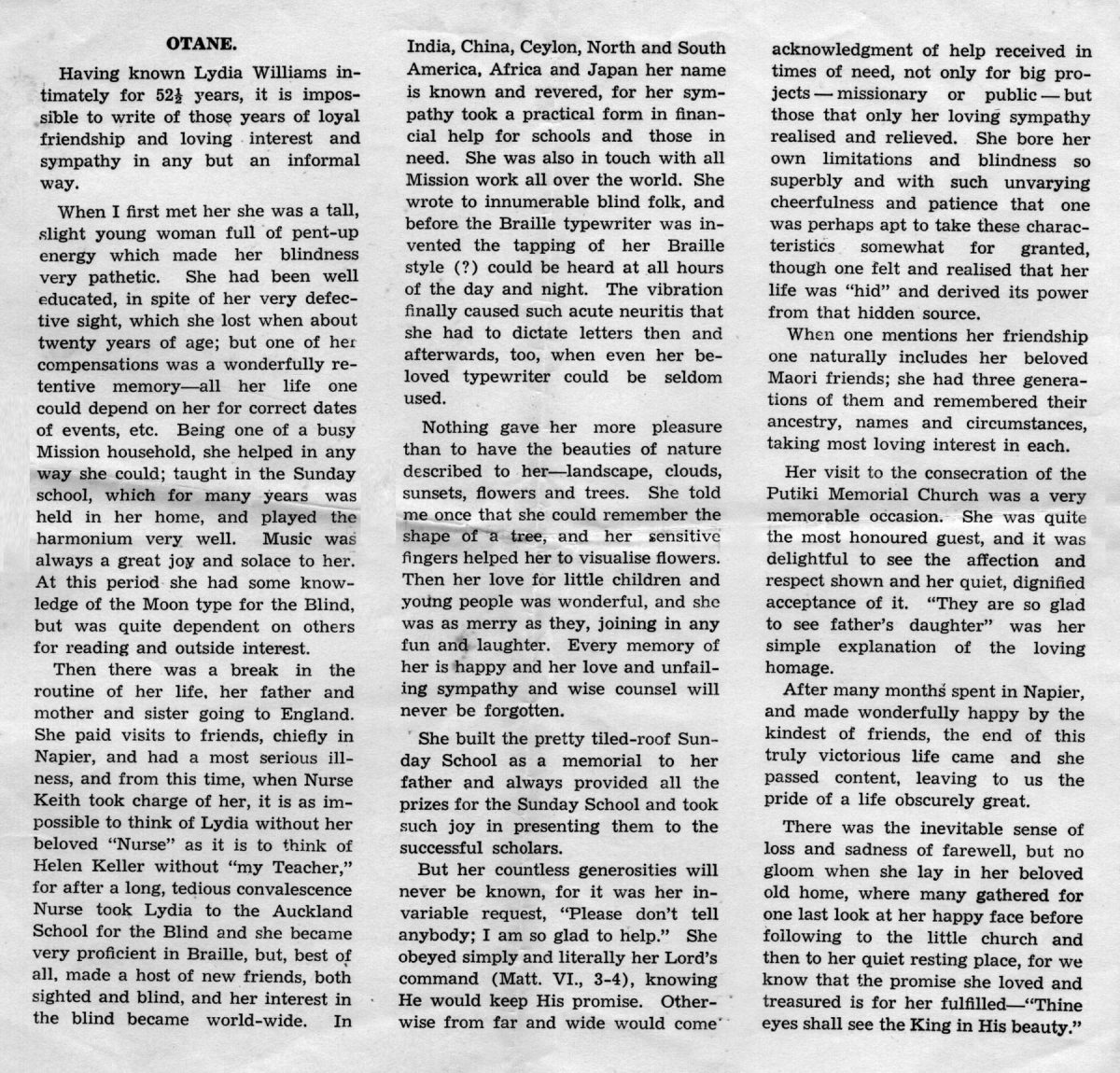OTANE.
Having known Lydia Williams intimately for 52½ years, it is impossible to write of those years of loyal friendship and loving interest and sympathy in any but an informal way.
When I first met her she was a tall, slight young woman full of pent-up energy which made her blindness very pathetic. She had been well educated, in spite of her very defective sight, which she lost when about twenty years of age; but one of her compensations was a wonderfully retentive memory – all her life one could depend on her for correct dates of events, etc. Being one of a busy Mission household, she helped in any way she could; taught in the Sunday school, which for many years was held in her home, and played the harmonium very well. Music was always a great joy and solace to her. At this period she had some knowledge of the Moon type for the Blind, but was quite dependent on others for reading and outside interest.
Then there was a break in the routine of her life, her father and mother and sister going to England. She paid visits to friends, chiefly in Napier, and had a most serious illness, and from this time, when Nurse Keith took charge of her, it is as impossible to think of Lydia without her beloved “Nurse” as it is to think of Helen Keller without “my Teacher,” for after a long, tedious convalescence Nurse took Lydia to the Auckland School for the Blind and she became very proficient in Braille, but, best of all, made a host of new friends, both sighted and blind, and her interest in the blind became world-wide. In India, China, Ceylon, North and South America, Africa and Japan her name is known and revered, for her sympathy took a practical form in financial help for schools and those in need. She was also in touch with all Mission work all over the world. She wrote to innumerable blind folk, and before the Braille typewriter was invented the tapping of her Braille style (?) could be heard at all hours of the day and night. The vibration finally caused such acute neuritis that she had to dictate letters then and afterwards, too, when even her beloved typewriter could be seldom used.
Nothing gave her more pleasure than to have the beauties of nature described to her – landscape, clouds, sunsets, flowers and trees. She told me once that she could remember the shape of a tree, and her sensitive fingers helped her to visualise flowers. Then her love for little children and young people was wonderful, and she was as merry as they, joining in any fun and laughter. Every memory of her is happy and her love and unfailing sympathy and wise counsel will never be forgotten.
She built the pretty tiled-roof Sunday School as a memorial to her father and always provided all the prizes for the Sunday School and took such joy in presenting them to the successful scholars.
But her countless generosities will never be known, for it was her invariable request, “Please don’t tell anybody; I am so glad to help.” She obeyed simply and literally her Lord’s command (Matt. VI., 3-4), knowing He would keep His promise. Otherwise from far and wide would come acknowledgment of help received in times of need, not only for big projects – missionary or public – but those that only her loving sympathy realised and relieved. She bore her own limitations and blindness so superbly and with such unvarying cheerfulness and patience that one was perhaps apt to take these characteristics somewhat for granted, though one felt and realised that her life was “hid” and derived its power from that hidden source.
When one mentions her friendship one naturally includes her beloved Maori friends; she had three generations of them and remembered their ancestry, names and circumstances, taking most loving interest in each.
Her visit to the consecration of the Putiki Memorial Church was a very memorable occasion. She was quite the most honoured guest, and it was delightful to see the affection and respect shown and her quiet, dignified acceptance of it. “They are so glad to see father’s daughter” was her simple explanation of the loving homage.
After many months spent in Napier, and made wonderfully happy by the kindest of friends, the end of this truly victorious life came and she passed content, leaving to us the pride of a life obscurely great.
There was the inevitable sense of loss and sadness of farewell, but no gloom when she lay in her beloved old home, where many gathered for one last look at her happy face before following to the little church and then to her quiet resting place, for we know that the promise she loved and treasured is for her fulfilled – “Thine eyes shall see the King in His beauty.”












Do you know something about this record?
Please note we cannot verify the accuracy of any information posted by the community.